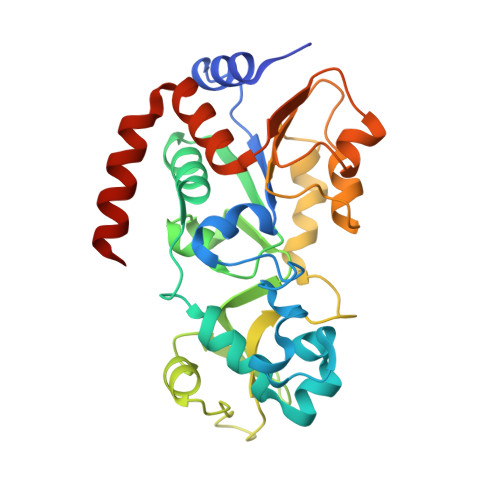Discovery of Thieno[3,2-d]pyrimidine-6-carboxamides as Potent Inhibitors of SIRT1, SIRT2, and SIRT3.
Disch, J.S., Evindar, G., Chiu, C.H., Blum, C.A., Dai, H., Jin, L., Schuman, E., Lind, K.E., Belyanskaya, S.L., Deng, J., Coppo, F., Aquilani, L., Graybill, T.L., Cuozzo, J.W., Lavu, S., Mao, C., Vlasuk, G.P., Perni, R.B.(2013) J Med Chem 56: 3666-3679
- PubMed: 23570514
- DOI: https://doi.org/10.1021/jm400204k
- Primary Citation of Related Structures:
4JSR, 4JT8, 4JT9 - PubMed Abstract:
The sirtuins SIRT1, SIRT2, and SIRT3 are NAD(+) dependent deacetylases that are considered potential targets for metabolic, inflammatory, oncologic, and neurodegenerative disorders. Encoded library technology (ELT) was used to affinity screen a 1.2 million heterocycle enriched library of DNA encoded small molecules, which identified pan-inhibitors of SIRT1/2/3 with nanomolar potency (e.g., 11c: IC50 = 3.6, 2.7, and 4.0 nM for SIRT1, SIRT2, and SIRT3, respectively). Subsequent SAR studies to improve physiochemical properties identified the potent drug like analogues 28 and 31. Crystallographic studies of 11c, 28, and 31 bound in the SIRT3 active site revealed that the common carboxamide binds in the nicotinamide C-pocket and the aliphatic portions of the inhibitors extend through the substrate channel, explaining the observable SAR. These pan SIRT1/2/3 inhibitors, representing a novel chemotype, are significantly more potent than currently available inhibitors, which makes them valuable tools for sirtuin research.
Organizational Affiliation:
Sirtris a GSK Company, Cambridge, Massachusetts, United States. [email protected]
















